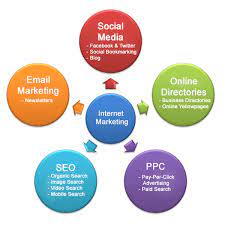The Role of Internet Marketing in E-Commerce
In today’s digital age, e-commerce has become a vital part of the global economy. With the rise of online shopping, businesses are constantly looking for ways to stand out in the crowded digital marketplace. This is where internet marketing plays a crucial role.
What is Internet Marketing?
Internet marketing, also known as online marketing or digital marketing, refers to promoting products or services through various online channels. These can include websites, social media platforms, email campaigns, search engine optimization (SEO), and more. The goal of internet marketing is to reach a wide audience and drive traffic to a business’s website to increase sales and brand awareness.
The Importance of Internet Marketing in E-Commerce
For e-commerce businesses, internet marketing is essential for several reasons:
- Increased Visibility: Effective internet marketing strategies can help e-commerce businesses reach a larger audience and attract potential customers who may not have discovered them otherwise.
- Targeted Advertising: Through tools like social media advertising and Google AdWords, e-commerce businesses can target specific demographics and interests, ensuring that their marketing efforts are reaching the right people.
- Improved Customer Engagement: Internet marketing allows businesses to engage with their customers through various channels such as social media, email newsletters, and blogs. This helps build relationships with customers and encourages repeat business.
- Data Analysis: With internet marketing tools like Google Analytics, e-commerce businesses can track the performance of their campaigns in real-time. This data allows them to make informed decisions and adjust their strategies for better results.
- Ease of Access: The internet provides a level playing field for businesses of all sizes. Small e-commerce startups can compete with larger companies by leveraging cost-effective internet marketing techniques to reach their target audience.
In Conclusion
Internet marketing plays a vital role in the success of e-commerce businesses. By implementing effective online strategies, businesses can increase their visibility, engage with customers, and drive sales in the competitive world of online retail. As technology continues to evolve, staying ahead with innovative internet marketing tactics will be key to thriving in the ever-changing landscape of e-commerce.
Essential Internet Marketing Tips for Boosting E-commerce Success
- 1. Create a user-friendly website with easy navigation and clear call-to-action buttons.
- 2. Optimise your website for search engines to improve visibility and attract more organic traffic.
- 3. Utilise social media platforms to engage with customers, promote your products, and drive traffic to your website.
- 4. Implement email marketing campaigns to nurture leads, retain customers, and encourage repeat purchases.
- 5. Offer various payment options and ensure a secure checkout process to build trust with customers.
- 6. Provide high-quality product images and detailed descriptions to enhance the online shopping experience for customers.
- 7. Monitor key performance indicators (KPIs) such as conversion rates, customer acquisition cost, and return on investment to track the effectiveness of your internet marketing strategies.
1. Create a user-friendly website with easy navigation and clear call-to-action buttons.
To enhance your e-commerce success through internet marketing, it is crucial to create a user-friendly website with easy navigation and clear call-to-action buttons. By designing a website that is intuitive and easy to navigate, you can provide a seamless shopping experience for your customers, encouraging them to explore your products and make purchases. Clear call-to-action buttons prompt visitors to take specific actions, such as adding items to their cart or signing up for newsletters, ultimately leading to increased conversions and improved customer engagement. A well-structured website with user-friendly features can significantly impact your online business’s growth and success in the competitive e-commerce landscape.
2. Optimise your website for search engines to improve visibility and attract more organic traffic.
To enhance your online presence and attract a larger audience in the competitive realm of e-commerce, it is crucial to optimise your website for search engines. By implementing effective search engine optimisation (SEO) strategies, you can improve your website’s visibility in search engine results pages, ultimately driving more organic traffic to your site. This increased visibility not only helps potential customers discover your products or services more easily but also boosts your overall online credibility and brand awareness.
3. Utilise social media platforms to engage with customers, promote your products, and drive traffic to your website.
To maximise the impact of your internet marketing efforts in e-commerce, it is crucial to leverage social media platforms effectively. By utilising platforms such as Facebook, Instagram, and Twitter, businesses can engage with their customers on a more personal level, showcase their products or services, and ultimately drive traffic to their website. Through strategic social media marketing campaigns that focus on building relationships with customers and creating compelling content, businesses can enhance brand visibility and attract a wider audience in the competitive online marketplace.
4. Implement email marketing campaigns to nurture leads, retain customers, and encourage repeat purchases.
Implementing email marketing campaigns is a crucial strategy in e-commerce to nurture leads, retain customers, and encourage repeat purchases. By sending targeted and personalised emails to potential customers and existing clients, businesses can build relationships, provide valuable information, and promote special offers. This direct communication channel allows companies to stay top-of-mind with their audience, drive engagement, and ultimately boost sales through effective follow-up and customer retention tactics.
5. Offer various payment options and ensure a secure checkout process to build trust with customers.
To build trust with customers in e-commerce, it is essential to offer various payment options and ensure a secure checkout process. By providing customers with multiple payment methods, such as credit card, PayPal, and bank transfer, businesses cater to diverse preferences and make the purchasing experience convenient. Additionally, implementing robust security measures during the checkout process, such as SSL encryption and secure payment gateways, reassures customers that their personal and financial information is safe. This commitment to offering flexibility and security not only enhances customer confidence but also contributes to building a loyal customer base in the competitive e-commerce landscape.
6. Provide high-quality product images and detailed descriptions to enhance the online shopping experience for customers.
To enhance the online shopping experience for customers in e-commerce, it is crucial to provide high-quality product images and detailed descriptions. By ensuring that customers have access to clear and visually appealing images of products, along with comprehensive descriptions that highlight key features and benefits, businesses can instill confidence in their potential buyers. This attention to detail not only helps customers make informed purchasing decisions but also contributes to building trust and loyalty towards the brand, ultimately leading to a more satisfying shopping experience for online shoppers.
7. Monitor key performance indicators (KPIs) such as conversion rates, customer acquisition cost, and return on investment to track the effectiveness of your internet marketing strategies.
Monitoring key performance indicators (KPIs) is crucial in the realm of internet marketing for e-commerce. By keeping a close eye on metrics such as conversion rates, customer acquisition cost, and return on investment, businesses can gain valuable insights into the effectiveness of their online marketing strategies. Tracking these KPIs allows e-commerce entrepreneurs to make data-driven decisions, optimise their campaigns, and allocate resources efficiently to maximise their online presence and drive sustainable growth in the competitive digital landscape.


